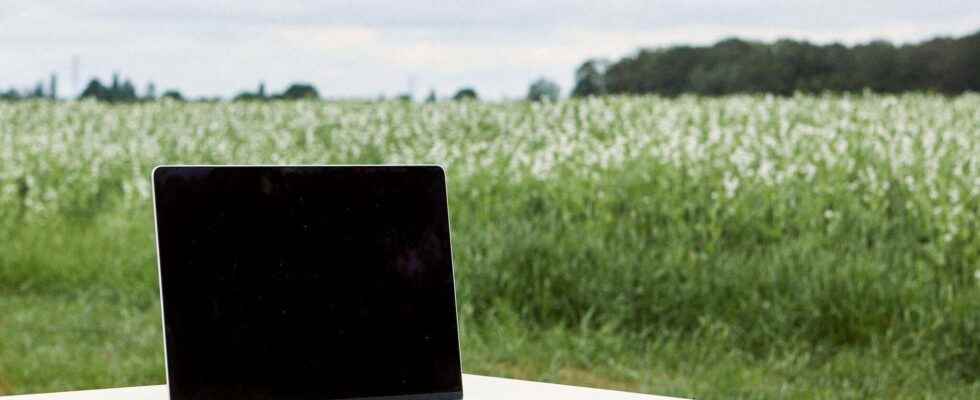Within three years, 160,000 farms will be looking for buyers and, each year, 70,000 agricultural jobs are to be filled. Based on this observation and his experience, the former co-founder of BlaBlaCar, Francis Nappez, is launching a call for projects to support 80 startups which will be hosted for 2 years and integrated into the largest agricultural campus in the world. Code name: Hectar. Mission: promote solutions for farmers and support entrepreneurship.
You will also be interested
[EN VIDÉO] Our agriculture soon to be affected by global warming Some of the effects of global warming are already being felt. Others are yet to come. The yields of certain crops could thus drop significantly from 2030 as a result of rising temperatures, variations in rainfall patterns and high levels of carbon dioxide (CO2) in the atmosphere. This is the conclusion of researchers who have worked on the most efficient climate and crop models of the moment. Maize yields, for example, could decline sharply. (in English) © Nasa Goddard
Of the car tractor: Francis Nappez, former co-founder of BlaBlaCar, now manages Hectar, the largest agricultural campus in the world, which offers training and has just launched a call for projects to accelerate 80 startups, driving innovations for the agriculture of tomorrow.
What challenges does this call for projects address for Hectar?
Francis Nappez : Our mission is to build a campus that promotes solutions for farmers through training and support for entrepreneurship. The challenge is to work on the attractiveness of this sector where 160,000 farms will be taken over within three years and 70,000 agricultural jobs are to be filled each year. It is also about being able to support farmers already in place in their necessary regenerative transition and to ensure, even increase, their income. via for example energy recovery.
For us, tech represents a considerable lever to achieve this through four areas that we are targeting with this call for projects: AgriTech (L’AI, the robotic, equipment …); the FoodTech for food that respects biodiversity and waste management; the future Farming with answers for the resilience of the food production in the face of hazards; and finally, regenerative agriculture which implements more sustainable practices in favor of respect for the soil and the sequestration of the carbon.
In this regard, what exactly does the emerging term regenerative agriculture cover?
FN : The term is not contradictory with the notion of organic which is now included in the codes common. On the contrary, regenerative agriculture complements it and goes further. Where organic despite its virtues, can have an impact on the mechanization and compaction of soils, regenerative agriculture promotes respect for the soil, crop rotation, obviously without pesticides. The Grail that we are pursuing with our pilot farm is precisely to be able to reconcile the two, as some people are also starting to do.
How do you respond to the reluctance that was expressed in particular by representatives of public agricultural education when the Hectar outbreak was announced?
FN : We do not in any way wish to replace public agricultural education but on the contrary, here again, to complete their courses on subjects that are not sufficiently addressed in existing structures such as technology, economic development or even more virtuous environmental practices.
We also address different audiences in our training courses, namely for us the majority of adults in retraining, therefore already with a professional background that they now wish to orient towards agriculture. Their common point is to be committed, convinced and passionate about responding to fundamental issues such as climate change or food of humanity.
What do you offer to project leaders interested in your call for projects?
FN : The 80 startups that we will host in 2 years will be integrated into the largest agricultural campus in the world. They will have 30 mentors, 500 experts, 40 workshops, 2,000 m2 of workspaces and conviviality, 50 hectares of experimentation. On a daily basis, they will be immersed in an ecosystem promoting collective emulation and entrepreneurial opportunities because they will coexist both with future agricultural business leaders, coders and computer engineers, and the pilot farm team in organic transition and regenerative agriculture. In addition to the partnership with the HEC Paris incubator, Hectar benefits from the support of three companies, Timac Agro, Parfums Christian Dior, Naturalia, and a dynamic ecosystem (CCI Ile de France, French Impact, Makesense, La FoodTech, BPI France …).
With Hectar, it is a question of the future of our soils, of agriculture, but also of ensuring the quality and sovereignty of our food.
Designed to be part of the agricultural landscape in the long term, how do you hope that Hectar can evolve in the long term?
FN : Hectar is certainly not currently representative of agriculture in France. We settled in Île-de-France for its proximity to Paris, but also because, contrary to popular belief, it is a large agricultural region. However, we welcome people who come from all over France, and as the agricultural context is necessarily linked to the territory in which it is established, we are now thinking about collaborating with other projects and other more local entities. We also already have international requests from countries whose agriculture responds to issues of national sovereignty.
Before leading Hectar, you had great entrepreneurial success, notably with the co-founding of BlaBlaCar. How did you go from the car to the tractor?
FN : My engine is to concentrate my energy and my skills on impactful solutions. With BlaBlaCar, the intention was to develop carpooling, in particular to reduce emissions of CO2. With Hectar, it is a question of the future of our soils, of agriculture, but also of ensuring the quality and sovereignty of our food. I am convinced that my tech profile can contribute to bringing new solutions to a sector in full evolution, which must face capital challenges such as the renewal of generations, climate change, world food …
Interested in what you just read?
.
fs11
